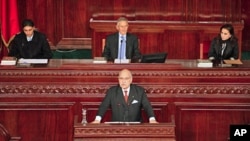The catalyst of the wider Arab Spring protests, Tunisia inaugurated its new Constituent Assembly Tuesday following a power-sharing agreement between moderate Islamists and secular parties.
Tunisia's new 217-seat Constituent Assembly began work Tuesday, almost a month after the tiny North African country held its first democratic elections. The first tasks were formalities - swearing in the prime minister, president and assembly speaker.
The top job of prime minister goes to Hamadi Jebali of the moderate Islamist Ennahda party, which captured the lion's share of the seats in Tunisia's October 23 vote. The Islamists have formed a governing coalition with two secular parties, the leftist Congress for the Republic and the Ettakatol, which respectively got the presidency and assembly speaker positions.
Tunisia's January revolution triggered pro-democracy protests across the Arab world. Now, says Mansouria Mokhefi, head of Middle East and North Africa programs at the French Institute of International Relations, the country's next steps toward democracy will be closely watched.
Mokhefi says Tunisia is the major test of the Arab Spring. The political direction the Arab Spring uprisings take will depend on the success or failure of Tunisia.
As the country's most powerful political force, Ennahda has attracted plenty of controversy. Political opponents and women's rights activists warn it will erode social freedoms.
But Ennahda vows to maintain the country's secular image and the considerable rights of Tunisian women. In an interview on French radio, Ennahda deputy Mohamed Bensalem said the party wants to work with everyone.
Bensalem says Ennahda is open to dialogue. Those who claim otherwise are deliberately excluding themselves from the process.
Mansouria Mokhefi agrees that Ennahda's rhetoric has been inclusive.
Mokhefi says Ennahda's platform has attracted many of the country's social classes - the poor, the middle class, the well-educated and even women who do not wear veils. She believes the bigger rift is between Ennahda and more hardline Islamists.
The new government is tasked with drawing up a constitution and political system. It vows it will hold new elections in a year. It faces other major challenges, as well, including attracting foreign investment and rebooting the country's faltering economy.
| Join the conversation on our social journalism site - Middle East Voices. Follow our Middle East reports on Twitter and discuss them on our Facebook page. |














